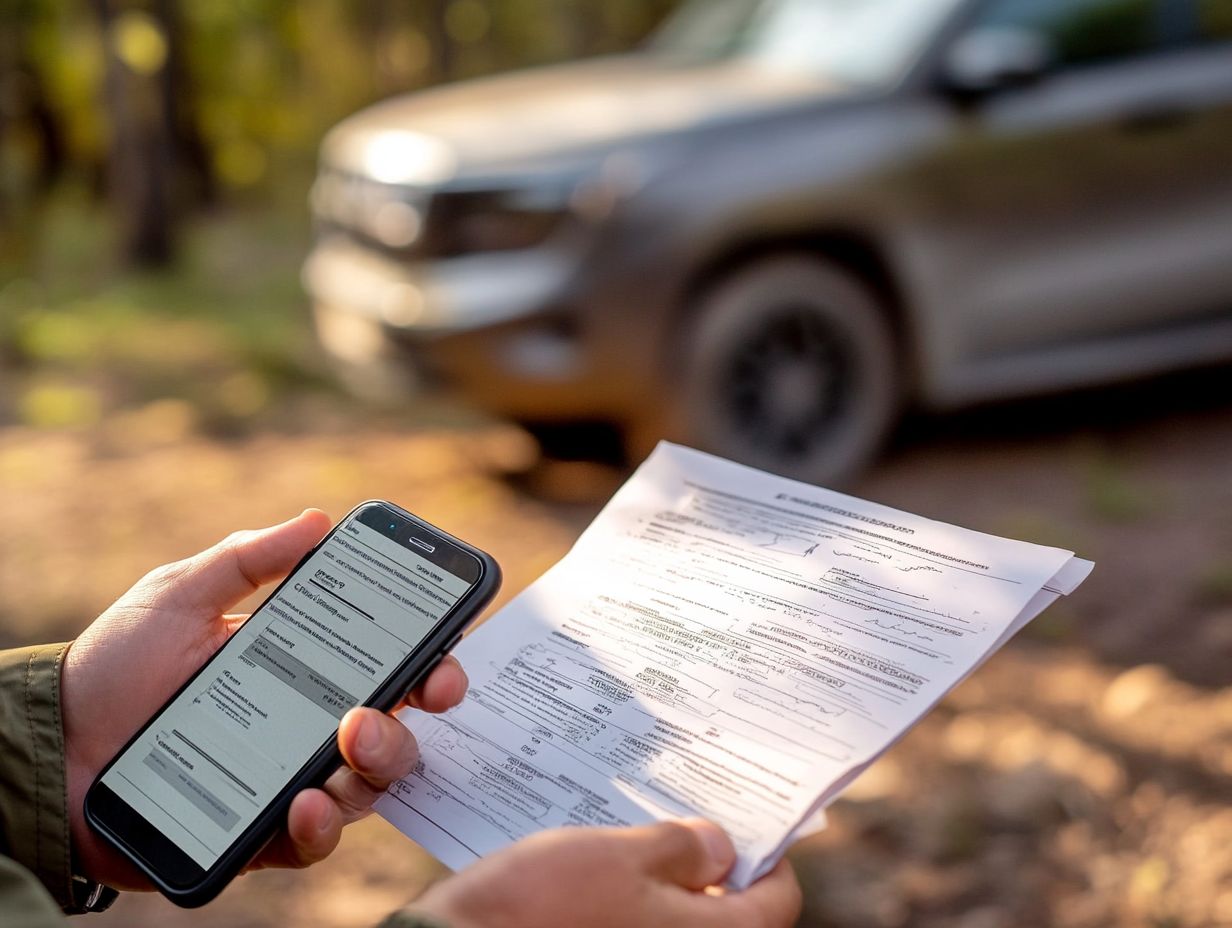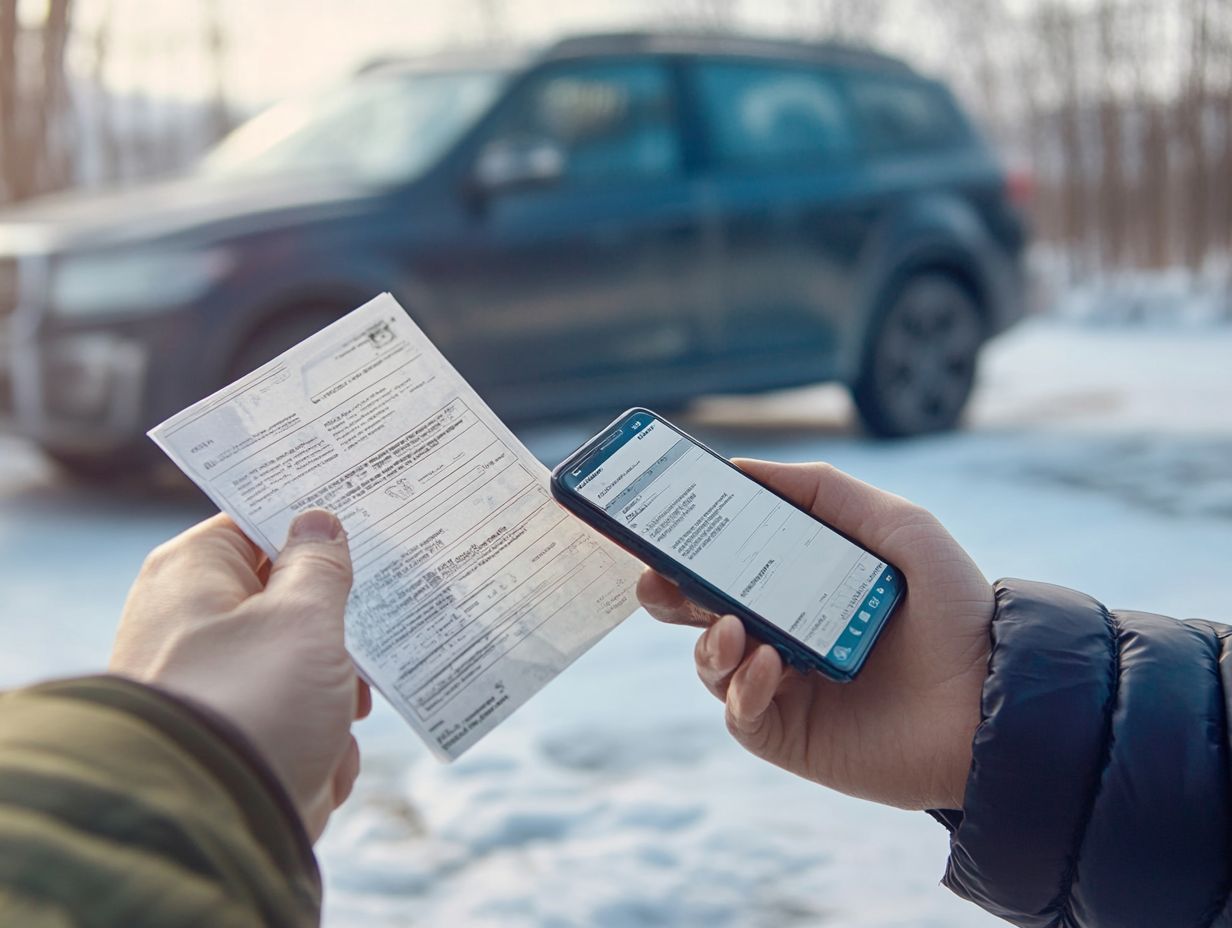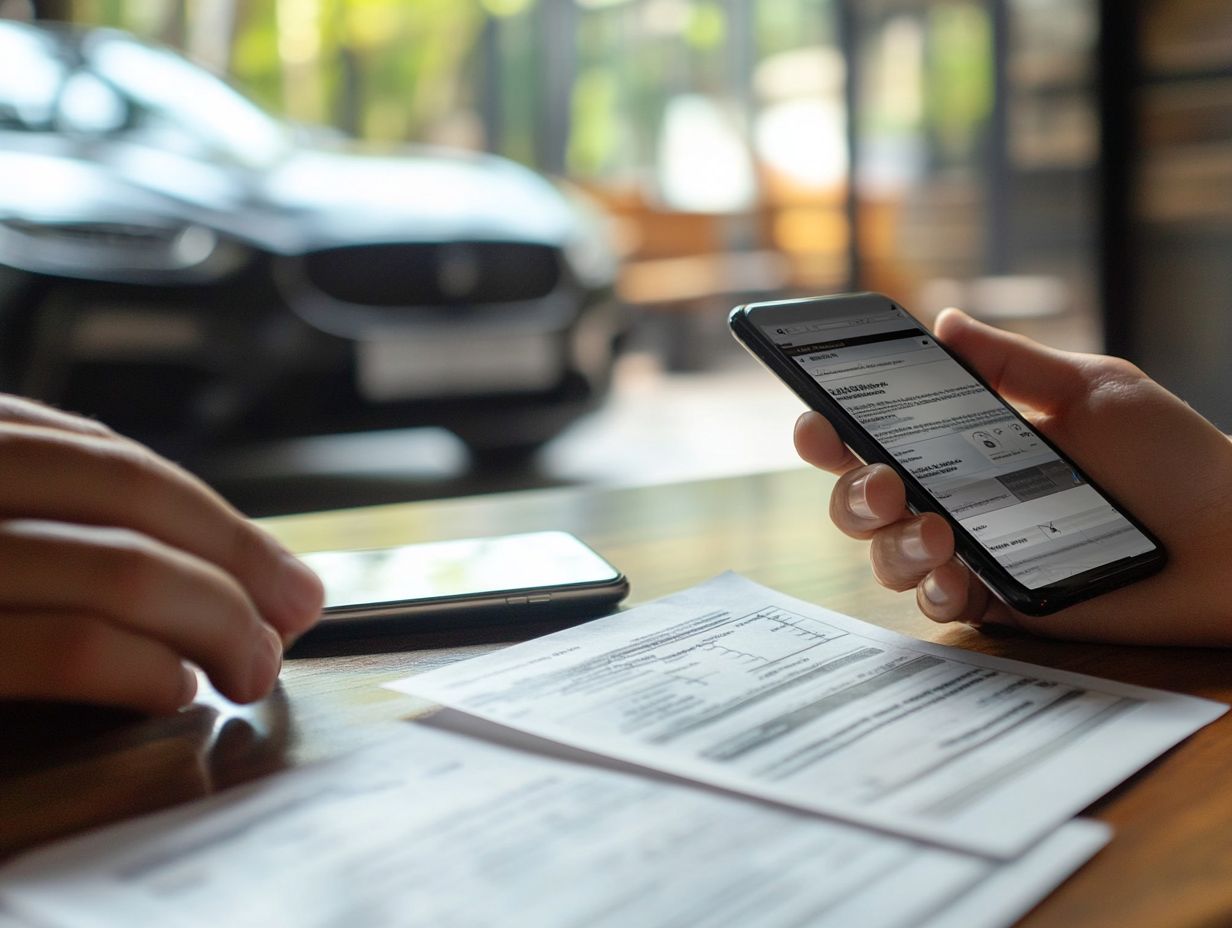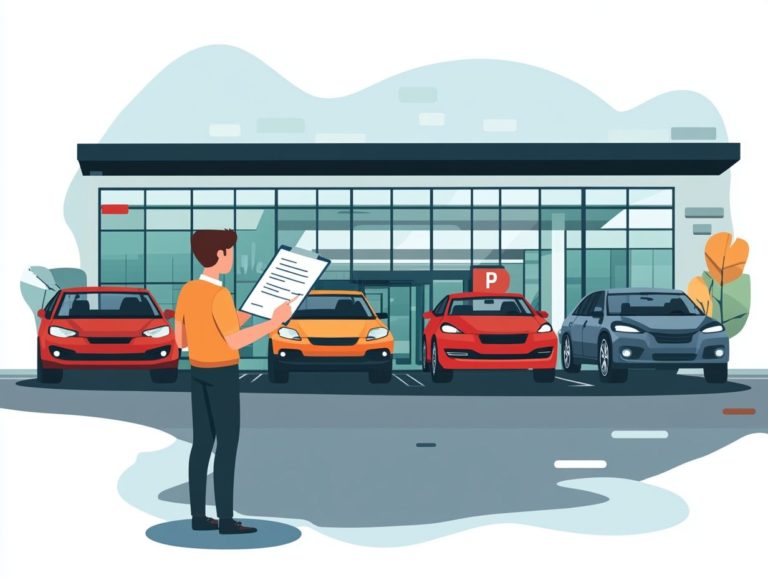How to Verify a Used Car’s Title
When you’re considering buying a used car, grasping the ins and outs of the vehicle title is essential for a seamless and secure transaction.
A vehicle title is more than just a piece of paper; it confirms ownership and unveils critical details about the car’s history.
This guide will walk you through the various types of vehicle titles, highlight the risks linked to problematic titles, and outline the vital steps to verify a used car’s title.
You’ll discover tips to help you identify potential red flags, ensuring you make an informed purchase.
Dive in to protect your investment!
Contents
- Key Takeaways:
- Understanding Vehicle Titles
- Why Verifying a Used Car’s Title is Important
- Steps to Verify a Used Car’s Title
- Tips for Avoiding Title Issues
- Frequently Asked Questions
- What is a used car’s title?
- Why is it important to verify a used car’s title?
- How can I verify a used car’s title?
- What happens if I buy a used car with a fraudulent or invalid title?
- What should I do if I have doubts about a used car’s title?
- Are there any online resources to help verify a used car’s title?
Key Takeaways:

- Know the types of vehicle titles to ensure you’re buying a car with a clean title.
- Verify a used car’s title to avoid risks and legal issues.
- Always obtain the VIN, check the vehicle history report, and request a title search.
Understanding Vehicle Titles
Understanding vehicle titles is crucial when buying or selling used cars. This knowledge helps you avoid potential pitfalls.
A vehicle title acts as a legal document that confirms ownership and provides essential details about the car’s history. Grasping the importance of title verification is vital to steer clear of potential pitfalls, like buying a car with a salvage title, undisclosed accident history, or outstanding loans.
By familiarizing yourself with the National Motor Vehicle Title Information System (NMVTIS) a database that helps you verify vehicle titles you can conduct thorough title searches, ensuring that the vehicle registration document is both legitimate and free from any encumbrances.
What is a Vehicle Title?
A vehicle title is a legal document that establishes your ownership of a car, containing essential details like its make, model, and Vehicle Identification Number (VIN).
This document is pivotal in the car ownership journey, as it not only confirms who holds the title to the vehicle but also encompasses important historical information, including any liens or outstanding loans.
A vehicle title is a primary requirement for registering your vehicle, ensuring that state authorities recognize your claim.
Without a proper title, you may face significant hurdles when attempting to sell or transfer ownership, underscoring its importance in demonstrating your legal rights and facilitating smooth transactions in the automotive marketplace.
Types of Vehicle Titles
Several types of vehicle titles exist that you should familiarize yourself with, including clean titles, salvage titles, and rebuilt titles. Each type corresponds to a distinct history of the vehicle.
Understanding these nuances is essential for you as a potential owner, as they can directly impact the vehicle’s value and resale potential.
A clean title indicates that the vehicle has never experienced a significant accident or major damage, making it a highly desirable option for discerning buyers like yourself.
In contrast, a salvage title reveals that the vehicle was deemed a total loss by an insurance company, often due to severe accidents or natural disasters, which can significantly diminish its market value.
A rebuilt title indicates that repairs have been made, but it may still carry an implied risk regarding its past. You must also consider any accident history and repairs, as these factors can complicate title status and influence your ownership decisions.
Why Verifying a Used Car’s Title is Important
Verifying a used car’s title is essential for ensuring that you are dealing with a vehicle that is legally owned, free from liens, and accurately represented regarding its accident history or salvage status.
A thorough title search can reveal potential red flags that might impact ownership, such as previous accidents or unresolved legal issues associated with the vehicle.
By understanding the vehicle’s history, you not only shield yourself from potential fraud but also enable yourself to make informed decisions about repairs and future resale value.
Don t risk your hard-earned money! Verify the title to avoid legal troubles and financial headaches.
Potential Risks of a Problematic Title

The risks associated with a problematic title can negatively impact your finances and legal standing when owning a used car. These issues often lead to problems that may not be immediately evident.
Complexities surrounding ownership rights can leave you open to claims from previous owners or lenders. Cars with salvage titles often carry a stigma, which can significantly lower their resale value. Potential buyers may hesitate to purchase these vehicles due to concerns about hidden damages or unresolved legal issues.
Undisclosed accident histories can complicate matters further, resulting in unexpected repair costs or insurance challenges surfacing after your purchase. Understanding the implications of a problematic title is crucial for anyone looking to protect their investment and avoid unnecessary headaches.
Steps to Verify a Used Car’s Title
Verifying a used car’s title requires careful steps.
Start by getting the Vehicle Identification Number (VIN). This number is crucial for checking the vehicle’s history, revealing ownership details and any potential legal issues.
1. Obtain the Vehicle Identification Number (VIN)
Your first step in verifying a used car’s title is to obtain the Vehicle Identification Number (VIN). This unique number identifies the vehicle.
You can find the VIN in several places, like the dashboard or the driver s side door frame. This 17-character code provides important information about the car s history, including its make, model, and year of manufacture.
The VIN is essential for conducting title searches, allowing access to comprehensive vehicle history reports that reveal any previous accidents, title issues, or odometer discrepancies.
Using the VIN during the title verification process helps you make informed decisions and avoid potential pitfalls when purchasing a used vehicle. Start your verification today!
2. Research the Vehicle History Report
Researching the vehicle history report gives you crucial insights into a car’s past. This includes details about accidents, ownership changes, and title discrepancies.
This valuable document serves as a key tool for you as a potential buyer, shedding light on service records, mileage verification, and any recalls the vehicle may have faced.
By utilizing a vehicle history report, you can confirm that the title information is legitimate and free from liens. You’ll gain peace of mind knowing there are no hidden issues that could compromise the vehicle s performance or safety.
Accessing these reports is easy; many online resources let you input the VIN and retrieve detailed information about the car s history. This way, you can make informed purchasing decisions.
3. Request a Title Search
Requesting a title search through the National Motor Vehicle Title Information System (NMVTIS) is a crucial step in confirming the legal status of a vehicle and its registration history.
This process provides key information about any liens, theft records, or serious accidents linked to the vehicle, ensuring that the seller is the rightful owner.
When starting a title search, gather essential documents like proof of identity and the VIN. Be prepared to pay a small fee for access, which can vary by state and search provider.
Understanding how NMVTIS operates helps you make informed choices, safeguarding your investment and providing peace of mind throughout the purchasing process. Act now to protect your investment!
Tips for Avoiding Title Issues

Avoiding title issues requires vigilance and a keen eye for red flags that may indicate deeper problems in a vehicle’s history or ownership.
Stay alert and don t miss out on securing your investment. Always conduct thorough research and follow the steps outlined above!
Red Flags to Look Out For
When considering the purchase of a used car, being aware of potential red flags can save you from future headaches.
Warning signs can take many forms. Inconsistent ownership records may raise doubts about the vehicle s legitimacy, while a salvage title indicates the car was deemed irreparable in the past. Discrepancies in repair records might hint at previous accidents that haven t been properly disclosed, posing risks on the road.
Don t miss out! Do your homework to avoid costly mistakes. Conducting a thorough background check and obtaining a vehicle history report can reveal these concerns early on. Being vigilant during the buying process helps you make informed decisions, ultimately safeguarding your investment.
Importance of a Thorough Inspection
Conducting a thorough inspection of a used car is essential for evaluating its physical condition and uncovering hidden issues.
Inspections provide critical insights that documentation might overlook. Signs of past accidents could be cleverly concealed by superficial repairs, while underlying mechanical issues may slip through the paperwork.
By enlisting a professional for these inspections, you gain a clear and accurate picture of the vehicle s status. These experts can spot red flags that might lead to future headaches.
Understanding the complete context of a car’s history covering previous ownership and maintenance practices enhances your decision-making process and helps you make better purchases.
Frequently Asked Questions
What is a used car’s title?
A used car’s title is a legal document that proves ownership of the vehicle.
Why is it important to verify a used car’s title?
Verifying a used car’s title ensures that the seller has the legal right to sell the vehicle and that the title is free of liens or issues.

How can I verify a used car’s title?
You can verify a used car’s title by:
- Checking that the Vehicle Identification Number (VIN) on the title matches the one on the car.
- Ensuring the title is in the seller’s name.
- Checking for any liens or other issues.
What happens if I buy a used car with a fraudulent or invalid title?
If you unintentionally buy a used car with a fraudulent or invalid title, you may not have legal ownership and could face legal or financial consequences. Always verify a used car’s title before making a purchase.
What should I do if I have doubts about a used car’s title?
If you have doubts about a used car’s title, consult with a trusted mechanic or take the vehicle to a reputable dealership for a title check. You can also contact your local department of motor vehicles for assistance.
Are there any online resources to help verify a used car’s title?
Yes, online resources like the National Motor Vehicle Title Information System (NMVTIS) and Carfax can provide information about a used car’s title history. However, it s still important to inspect the title and vehicle physically before making a purchase.
Take action now! Verify your prospective used car’s title to ensure a smooth and secure purchase.






